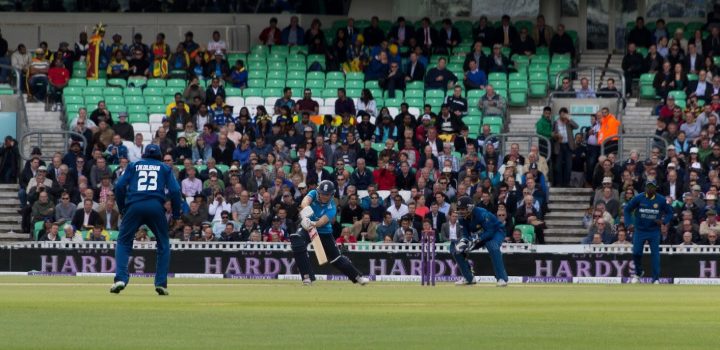It was late in the evening of December 25th, 2010, and as Christmas Day slipped into Boxing Day, I had a problem. The Melbourne Ashes test – about as important a match as there could possibly be – was about to begin, but I was spending Yuletide at the home of my parents, who can’t afford Sky Sports.
Luckily my brother had a solution, and one which was news to me: watch it on a hookey streaming website. He located one of the many such sites, clicked the mouse, and hey presto – we had the live action from the MCG. Ok, the pictures were a little jerky, but it was cricket all the same – and England were bowling Australia out for 98. What’s not to like?
But as it turns out, it’s a good job that ECB chairman Giles Clarke didn’t gatecrash our cosy little festive cricket party. He’d have given us a right ear-full, and completely ruined the atmos.
That’s because Clarke believes illicit streaming sites are currently the “biggest danger” to the entire game of cricket.
“We all have to be vigilant,” he said in an interview last month. “There are a huge number of pirate websites that stream cricket on the internet taken from television broadcasts, we and our broadcasters closed down 700 during last summer’s series against India.
“These pirate broadcasters are the biggest danger to cricket because they take money out of the game without commercial benefit to the sport. It is an extremely complex procedure to close down websites but it can be done and has to be done.”
What an insult. What arrogance. What complete bollocks.
Think of threats to cricket, and what comes to mind? Match fixing. Low test match attendances. Fixture overkill. Or in England, parlous county finances and the dearth of international-quality players who didn’t learn their cricket either at private school, or in South Africa.
None of those matter to Clarke. As far as he’s concerned, the biggest danger to cricket is – people watching cricket. How dare you fans watch England play – don’t you know the damage you’re doing! It reminds you of that classic quote from the film Dr Strangelove. ‘You can’t fight in here – this is the war room!’
Clarke will never shut down these sites – they’re too popular. Millions of cricket fans in England and around the world don’t have the means to purchase premium channels. I know from your correspondence that quite a few of you – TFT readers – use these services yourselves. The incentives for those who run them are so much more powerful than those of the people whose job it is to police them. The ECB are wasting their time.
It doesn’t occur to Giles Clarke that the majority of punters who visit streaming sites do so because they either can’t afford, or aren’t prepared, to fork out for Sky. Or maybe they’re just watching at work. Either way, Sky aren’t losing out, because it’s not money they would have had in the first place.
Neither is he struck by a fairly obvious point – the inverse of his prophecy. What danger is posed to cricket by people not watching it at all, especially children, because it’s no longer on free-to-air TV.
The ECB aren’t very interested in any of that, because they’re too busy tending to the interests of their BSkyB paymasters, hence the outburst over hookey websites. Last month, Sky’s £260 million deal for exclusive live cricket rights was renewed for another three years, up to 2017. The BBC – unforgivably – didn’t even bother bidding. If we’re being realistic, cricket will never again be on proper TV – and could presumably go the same way as rugby league or boxing: insular and marginalised.
According to Nick Hoult of the Daily Telegraph:
“There is now a general acceptance that the ECB has to maximise its revenue from live broadcast rights, a source of income which keeps county cricket afloat and funds Team England as well as grass roots programmes.”
General acceptance by who? The fans and supporters who actually have to pay for it? No one asked us. Hoult means the professional cricketing cognoscenti – the network of journalists, insiders and mandarins who set the agenda but sometimes fail to see things from the perspective of ordinary punters.
Where the hell does all this money go? We’re talking here about £87 million a year. Much of it is used to prop up loss-making county clubs, often subsidising their expensive overseas imports and swanky new stands which they built to host a test match once every three years. As for Team England – no one’s begrudging the players a decent wedge, but you can’t help suspecting there are plenty of people you’ve never heard of, behind the scenes, who are doing rather nicely out of all this, thank you very much.
The part that really grates is the ‘grass roots’ – an arch appeal to our emotions, and an act of gross deception by the ECB. Where is the money? Have you seen it? Are public cricket facilities being upgraded or built, such as park grounds? Are there grants available for village or wandering clubs? Are state school children – in meaningful numbers – getting access to cricket? No. Most of the cash goes to elite league clubs, who need it the least, and whose colts are already integrated into serious competitive cricket.
What would happen without the Sky money? Would we stop watching or playing cricket? The ECB predict Armageddon. In reality life would carry on as normal, only with fewer trebles all round at the top table.
In 2009, an independent review led by David Davies, the former FA executive, recommended that we should at least get the Ashes for free: the idea was to list it among the sporting events which must be available on regular television. That was before the last general election; the Conservative party opposed the idea and after forming the new government in 2010 formally shelved the plan until 2013. The Ashes will remain wholly in Sky’s hands for the time being.
Funny that, when you consider the fallout from the phone hacking scandal and what we learnt about collusion between the Tories and Rupert Murdoch’s companies. The Sun switched their support to David Cameron, and by an extraordinary coincidence, his party pledged not to endanger Sky’s cricketing monopoly. As ever in English cricket, the only thing which matters is political expediency and the personal interests of the people in charge. The supporters? Sorry. Keep buying the tickets, though.
You might say that by this stage I’m sounding as in the grip of a wildly delusional conspiracy theory. But as the old saying goes – just because you’re paranoid, it doesn’t mean they’re not out to get you.
Maxie Allen









Clarke didn’t come across well in the interview and Aggers did let him off the hook somewhat, but it’s not quite the clear cut case that you’re making it out to be. Although it’s good for punters to have access to cricket coverage, it’s worth considering who owns the sites that people are getting their streams from. There’ve been plenty of suggestions (albeit andecotal) that some pirate sites are linked to organised crime groups who in turn may be responsible for many of betting scams that we see across all sports. We as cricket fans can’t suddenly be appalled by sport-fixing if we’re helping prop up organisations that may well be intrinsically linked to it.
Dear Mr Clarke. I would really like to watch live cricket – it’s much better than watching sport on a rubbish computer – but I’m afraid that I can’t afford to pay £80 to watch England at Lord’s. I’m not allowed Sky at home either. Mr Mrs won’t allow it – and it’s rather expensive (almost as expensive as Lord’s).
However, as you, the Lord and Master of the universe (well, of English cricket anyway), think I’ll do irrevocable damage to the game I love by following it online, I think I’ll get my cricket fix from standing outside Lord’s, and peeking over the wall every five minutes. If I’m lucky, a passer-by might tell me the score. I reckon it’s much better if me and my two lads (and their mates) do this – because, after all, we don’t want to kill cricket by pursuing our interest in the game.
My wife reckons we should all just convert to bowls. There’s lot of that on free TV you know. But what does she know? She got into bed with a Texas billionaire who ended up in jail – and made our family look like a right bunch of plonkers!
Nice read.
The first commenter is correct: the situation is not as black and white as you make it seem. But, simply put, there has to be a better way. There has to be a middle ground where fans can have easy access to cricket without paying an arm and a leg – with the money going back into the proper cricketing channels.
We here in the states are actually luck. I subscribe to Willow.tv – it’s $20 US a month and I have access to all home matches in England, Australia, South Africa, and New Zealand. It’s legal, and reliable.
That should be an option worldwide.
Finally, your prediction that cricket could end up “marginalized” like boxing is a very scary thought indeed. Boxing, for all intents and purposes, is dead – and it is dead because no one can afford to watch it.
Here we go again. Everything’s the fault of dastardly old Mr Murdoch, and all the world’s problems would be solved if cricket was back on free-to-air TV. I accept Sky is quite pricey, but justifying piracy on that basis isn’t that far removed from saying it’s OK to break into Currys and nick a flat-screen TV because you can’t afford one.
I agree that there has to be some middle ground, and think ensuring highlights of all England’s games (home and away; Tests, ODIs and T20) are on free-to-air TV would be enough to satisfy most people. Who broadcasts ball-by-ball TV coverage isn’t actually that important, as the majority of time it’s on, people are at work or (for many away series) asleep: TMS and the radio or Cricinfo is enough to keep them up to date.
Just to add – the boxing analogy isn’t really on the point. Sky haven’t done boxing any favours, but that’s because they insist on following the US model and putting all big fights on pay per view, so if you’re a regular Sky Sports subscriber you have to pay extra to see it. I can’t see them doing this for cricket (they abandoned PPV for Premier League football some years ago as it proved unpopular).
Boxing is no longer on sky box office. People refused to pay £15 a pop, so its back on normal sky sports.
As for comparing watching illegal streams with breaking into curries and nicking televisions, I think we may have found the winner of the worst analogy of 2012 – and its only February! I take it you deplore YouTube, and equate watching it with breaking into George Lucas’s house and kidnapping his children.
As for saying ‘well, we are all at work during test matches, so all we need is a few highlights’, what about children during school holidays? They’re the future of the game. And what about weekends? Or people who don’t work? Some cricket should certainly be free to air.
The writer likes a pop at Murdoch, but who doesn’t? Few tycoons and few governments have done anything for cricket, and the role of sky in English sport (broadly speaking) is very contentious. It has done a service to some sports, but others have suffered. Football, for example, has suffered greatly from sky. They’ve created an uncompetitive league that only the very richest can win. They’ve inspired a generation of foreign mercenaries to come to these shores, and they’ve priced footballs traditional fan base out of the market (i.e. the working class).
There was a time when cricket was the national game. Now its position as a minority sport is pretty much entrenched. It really doesn’t help that access to live games is restricted to people who can afford sky. When was crickets greatest moment in recent times? A time when cricket became front page news for the right reasons? It was 2005. When cricket was last free to air. If only more people could’ve watched our subsequent rise to world test No.1? English cricket stars, in the main, are accessible and personable. Maybe cricket could have become a true national sport again?
Clarke and the ECB have decided to take the safe route by taking skys cash. Where’s their sense of romance and adventure? Cricket will remain a financially secure minority sport forever more if the status quo persists. If you’re happy with that, fine. Sky do after all do a good job. But what if …. There’s definitely a debate to be had.
Well said and well written.
I don’t want to duplicate these comments, so I’ll only further the sentiment that restricting your fan base deliberately by limiting the exposure of the public – particularly the young – to your sport in favour of a smaller, wealthier, and crucially older ‘elite’ audience (who are, almost by definition, already die-hard supporters) is virtually a text book example of sacrificing long-term sustainability for short-term profit, and can only contribute to a (potentially terminal) decline.
What’s more, my life-long love of cricket was heavily influenced by a childhood watching the likes of Gower, Botham, Richards, and Hadlee in full-flow, not by reading a dry report on Cricinfo. The great moments of cricket were made great by being witnessed and shared.
(an interesting post-script on the point of live coverage being on when people are at work or asleep – the live audience figures for the 2005 Ashes series ranged between 2.5 and a little over 8 million people. The viewing figures for cricket on Sky rarely get about 250,000)
Thanks for all your comments and feedback. Much appreciated.
I wasn’t trying to sing the praises, or the personal merits, of the people who run pirate sites. But whether they are are a force for good or is irrelevant: these sites are almost certainly here to stay, because people will always want to watch cricket for free. And why should anyone feel guilty about that when the sport is only available on premium channels.
My essential point is the irony of Giles Clarke complaining about something which was the entirely predictable consequence of his policy – and the fact he cares far more about Sky’s feelings than the public’s.
I didn’t blame Rupert Murdoch. Sky don’t make the regulatory decisions, and as a business they are entitled to do what they wish to make a profit. The ECB are not a business. They are supposed to represent the entire cricket community of England and Wales. Why did they lobby so hard to keep the Ashes a de-listed event? Would one free series every four years really hurt?
My solution would be to share the coverage. For example, Sky could have five tests a year, and all the ODIs, and the BBC two. That would not be too unpalatable for the deal-makers, but still give people at least some access to cricket on TV.
The risk of that kind of deal is that it may end up pleasing no-one. Sky have in the past wanted exclusive rights (or as near exclusive as the competition authorities have allowed) or they’re not interested, so if they’re only allowed 75% of the cricket they’ll probably pay a lot less than 75% of what they’d have paid for all of it. The BBC are under heavy political pressure not to pay over the odds for sporting rights, and may not be able to make up the shortfall. So
The risk of that kind of deal is that it may end up pleasing no-one. Sky have in the past wanted exclusive rights (or as near exclusive as the competition authorities have allowed) or they’re not interested, so if they’re only allowed 75% of the cricket they’ll probably pay a lot less than 75% of what they’d have paid for all of it. The BBC are under heavy political pressure not to pay over the odds for sporting rights, and may not be able to make up the shortfall. So less money will come into the game, and people will still moan you need to pay to see the bulk of the cricket.
That said, a coverage-sharing deal is exactly what the BBC and Sky have agreed for Formula One from this year onwards – it’ll be interesting to see how it works out and is received by F1 fans. If it does prove acceptable to the majority, maybe it’ll be a model worth following.